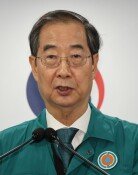U.S. Standard Chosen for Digital TV Broadcasting
U.S. Standard Chosen for Digital TV Broadcasting
Posted July. 08, 2004 22:14,
A final decision has been reached regarding the four-year controversy on which transmission method to adopt in digital television broadcasting, with the U.S. ATSC standard, which is currently partially used for some programs, emerging as the winner.
The Ministry of Information and Communication and the Korean Broadcasting Commission revealed that such a decision was reached on July 8 at the Four Person Digital TV Comparison Trial Committee, consisted of Minister Chin Dae-je of Information and Communication, Chairman Noh Sung-dai of the KBC, President Jung Yun-joo of KBS, and Chairman Shin Hak-lim of the National Union of Media Workers.
Regarding the digital broadcasting standard for mobile receivers such as mobile phones and car receivers, the terrestrial DMB will be primarily pursued, along with the introduction of DVB-H, a new technology standard.
Therefore, with the restart of the conversion process to digital broadcasting, which was suspended since partial digital broadcasting was launched in 2001, the industry is expected to be revitalized.
The Information Ministry cited that Korean viewers will be able to enjoy the Athens Olympics in August through their home TV via high-definition digital broadcasting.
The ministry added that 80 percent of the people will have access to digital broadcasting by the years end with five major metropolitan cities such as Busan, Daegu, Gwangju, Daejon, and Ulsan beginning digital broadcasting before the Athens Olympics kicks off.
The Information Ministry and KBC explained that the decision to continue using the U.S. standard for fixed receivers was reached when social and economic costs of switching transmission methods were taken into consideration.
Nah Bong-ha, head of the Telecommunications Satellite Division in the ministry, said, The conversion to digital broadcasting will be completed nationwide by the end of next year, and analogue TV broadcasting will stop altogether by around 2010.
Tae-Han Kim freewill@donga.com







